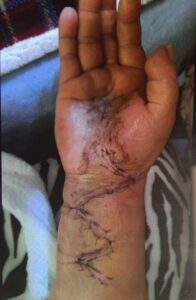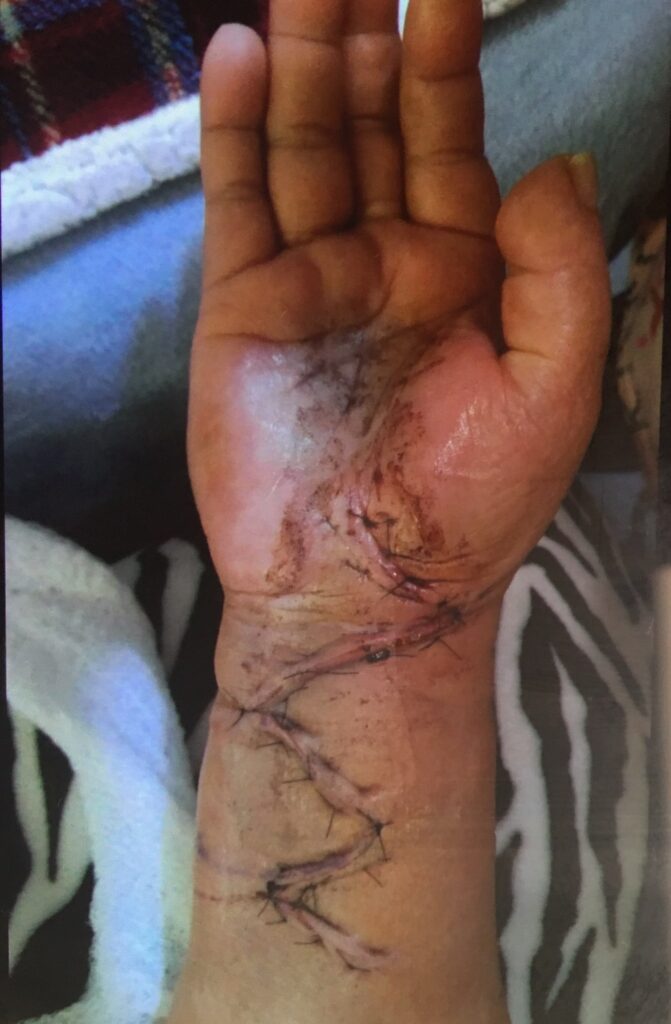***For Immediate Release***
Wednesday, September 4, 2019
Contact: Magdalena Cazarez
Communications Director, Nebraska Appleseed
Office: (402) 438-8853 Ext 119
Cell: (402) 504-0074
mcazarez@neappleseed.org
Abbie Kretz
Senior Organizer, Heartland Workers Center
Cell: (402) 630-6695
abbie@heartlandworkerscenter.org
Meatpacking workers’ safety and rights under threat
National report shows deregulation will worsen hazardous conditions
LINCOLN — In a major national report released today, Human Rights Watch describes alarmingly high rates of serious injury and chronic illness among workers at hog, cattle, and chicken slaughtering and processing plants. “When We’re Dead and Buried, Our Bones Will Keep Hurting”: Workers’ Rights Under Threat in US Meat and Poultry Plants reports the risk of worsening conditions if pending federal proposals move forward, weakening oversight of meat processing, and lifting limits on production speeds.
Human Rights Watch interviewed workers in six states, including workers from five communities in Nebraska, who described serious job-related injuries or illnesses, and nearly all the interviewed workers identified production speed as the factor that made their job dangerous.

“We’ve already gone from the line of exhaustion to the line of pain,” said Ignacio Davalos, a worker at a Nebraska plant. “When we’re dead and buried, our bones will keep hurting.”
“For more than a decade, Nebraska Appleseed and Heartland Workers Center have seen the devastating impact of inhumane work speeds and production pressures on individuals, families, and Nebraska communities,” said Darcy Tromanhauser, Director of Nebraska Appleseed’s Immigrants & Communities Program. “Permanently crippling pain and alarming injury rates continue to be the norm, even after more than ten years of research to document the problem and workers’ efforts to propose solutions. New federal proposals to decrease oversight of worker safety and public food safety are unacceptable.”
Human Rights Watch reports:
- A worker in the meat and poultry industry lost a body part or was sent to the hospital for in-patient treatment approximately every other day between 2015 and 2018, according to Occupational Safety and Health Administration’s (OSHA) data;
- Alarmingly high rates of serious injury and chronic illness among workers at hog, cattle, and chicken slaughtering and processing plants, as well as business practices that endanger workers and obscure the full reality of workplace hazards;
- Current and former workers’ experiences in which their lives, both in the plant and at home, have grown to revolve around managing chronic pain or sickness;
- An industry increasingly dominated by a few large corporations: the top four beef companies slaughter and process 85% of the beef market, the top four pork companies control nearly 65% of the hog market, and the top four poultry processors control almost 60% of the poultry market;
- Federal policy proposals are — instead of addressing the harms to workers — accelerating efforts to reduce oversight of slaughter inspection systems, work speeds, and worker and food safety.
“It should not be too much for workers to expect to go home safe after a day of hard work, but how many more Nebraskans have to have their lives irreparably changed because of unsafe conditions in industries of utmost importance in our state?” asked Sergio Sosa, Executive Director of the Heartland Workers Center. “The injuries, illnesses, and issues found in this report happened 15, 20, 30 years ago. Why do we continue to build a food industry based on unsafe work practices for thousands of working Nebraskans? Doing so is deeply shortsighted and cannot continue.”
Meat and poultry workers make more than 20,000 forceful motions per shift on the low end, up to as many as 100,000 motions per shift. These non-stop cutting, pulling, grabbing, twisting, and lifting motions result in debilitating injuries to arms, wrists, shoulders, necks, and backs.
In addition to current and former workers, Human Rights Watch interviewed more than 50 community and worker leaders, trade union representatives, attorneys, academic researchers, experts on workers’ safety and health, and former government officials. Human Rights Watch also reviewed extensive secondary sources of information, including reports from nongovernmental organizations and federal investigators, as well as government and academic studies, publicly available government data, and medical literature.
Background:
For nearly 20 years, Nebraska Appleseed, Heartland Workers Center, and Nebraska workers have worked with local and national partners to demonstrate the dangers in hog, cattle, and chicken processing plants and improve workers’ safety. These testimonials have been collected during years of Nebraska community meetings, forums, and worker surveys. More than a decade of academic, medical, and government findings show that these plants are some of the country’s most dangerous workplaces.
In 2013, Nebraska Appleseed, Southern Poverty Law Center, Heartland Workers Center, and nationwide worker and human rights groups formally petitioned the Occupational Safety and Health Administration (OSHA) and the United States Department of Agriculture (USDA) for work speed protections for meat and poultry workers.
Appleseed documented unacceptable injury rates and conditions in Nebraska’s meatpacking industry in the 2009 report The Speed Kills You, as did studies in Alabama (Unsafe at These Speeds, 2013), Arkansas (Wages and Working Conditions in Arkansas Poultry Plants, 2016), by the Midwest Coalition for Human Rights (Always Working Beyond the Capacity of Our Bodies, 2012), by Oxfam (Lives on the Line: The Human Cost of Cheap Chicken, 2015, and No Relief: Denial of Bathroom Breaks in the Poultry Industry, 2016), by Human Rights Watch’s original report (Blood, Sweat, and Fear, 2005), and by numerous media investigations, including the NPR/Harvest Public Media series, Dangerous Jobs, Cheap Meat.
Read the full report here.
Read an interview with researcher Matt McConnell here.
For more information and interview requests, please contact:
- Nebraska Appleseed Communications Director, Magdalena Cazarez (English, Spanish), at (402) 438-8853 Ext 119 (office), (402) 504-0074 (cell) or mcazarez@neappleseed.org.
- Heartland Workers Center Senior Organizer, Abbie Kretz (English, Spanish), at (402) 630-6695 or abbie@heartlandworkerscenter.org.
- Human Rights Watch, Matt McConnell (English, Spanish), at (909) 374-0144 (mobile) or mcconnm@hrw.org. Twitter: @mcconnell_m
# # #

